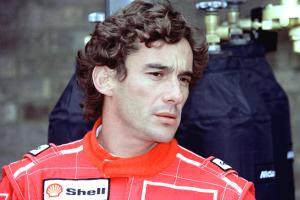It will also serve as a bitter reminder that since Senna's last title in 1991, there has never been a Brazilian world champion

Ayrton Senna
A master on the Formula One racing track, triple world champion Ayrton Senna was the pride of Brazil. Twenty-five years after his tragic death in the San Marino Grand Prix, he remains one of the country's biggest sporting legends.
ADVERTISEMENT
The anniversary of Senna's death on Wednesday -- dubbed "Senna Day" -- will revive the sense of loss and bewilderment that followed the shocking crash on the Imola circuit in Italy on May 1, 1994, that took the 34-year-old's life.
It will also serve as a bitter reminder that since Senna's last title in 1991, there has never been a Brazilian world champion. "There were some successes after Ayrton Senna ... but the lack of an internal structure in Brazilian motorsport did not allow its development," said Alexander Grunwald, a Brazilian motorsports journalist. Senna's death sparked an outpouring of grief around the world.
But his loss was felt acutely in Brazil where the sight of Senna, easily identifiable by his distinctive yellow crash helmet, taking the chequered flag, had been a rare source of joy for ordinary people struggling to make ends meet.
"In the 1980s we were living with hyperinflation, the end of the military dictatorship -- it didn't make sense to be proud of Brazil," explained Grunwald. "But Senna was carrying the Brazilian flag around the world like a symbol that made so many Brazilians proud." Senna's legacy was to "transform" F1 racing, said Grunwald.
Apart from his exceptional driving skills, his attention to other elements of the sport, such as physical and mental preparation, as well as understanding the vehicle and the technology that powered it, set him apart from other drivers. Such was his popularity among Brazilians that 25 years after his death Senna's image continues to be used in advertising and social campaigns. A survey in 2014 showed 47 percent of people in Senna's home city of Sao Paulo ranked him as the biggest sporting name in the country. Football great Pele was a distant second.
Pele, a three-time World Cup winner, played at "a time when people listened to football on the radio or read it in the newspaper -- it wasn't the same intensity or emotion," explained Grunwald. "With Senna, it was Sundays with the family" in front of the television. Cultural and sporting events are planned for "Senna Day" at Sao Paulo's Interlagos track.
Catch up on all the latest sports news and updates here. Also download the new mid-day Android and iOS apps to get latest updates
 Subscribe today by clicking the link and stay updated with the latest news!" Click here!
Subscribe today by clicking the link and stay updated with the latest news!" Click here!







